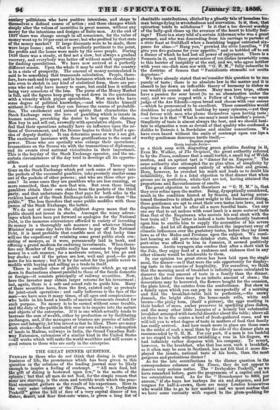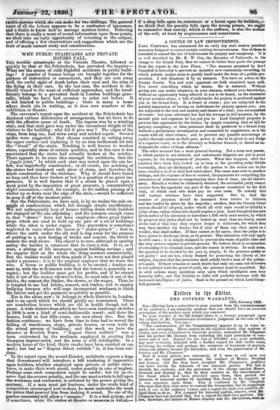THE GREAT DINNER QUESTION.
PERHAPS to those who do not think that dining is the great business of life, the prominence which has been given to this *guestion in the columns of the leading journal may be likely enough to inspire a feeling of contempt. "All men feed, but the gift of dining is bestowed upon few," is the motto of the epicure ; but that all men do not feed, for the simple reason that some are starving, is the stern and terrible truth which the prac- tical economist gathers as the result of his experience. Here in the very same column of the Times, wherein "A Derbyshire Peakrill ' gives the bill of fare of a very capital dinner of ten dishes, desert, and four first-rate wines, is given a long list of charitable contributions, elicited by a ghastly tale of homeless hu- man beings dying in wretchedness and starvation. Is it, then, that epicurism tends to selfishness ? Is it that a too devout worship of the belly-god closes up the avenues of the heart to kindly feel- ings ? There is a story told of a certain Alderman who was a great gourmet, and who was descending from his carriage to partake of a civic feast at Guildhall when a famishing beggar entreated six- pence for alms—" Hang you," growled the civic Dimling, "I'd give you five guineas for your appetite," and so hobbled off to eat a dinner of which he had lost all power of enjoyment. There is a Nemesis in it, and these great eaters of ten dishes invariably come to this barrier of insipidity at the end, and we, who agree neither with your one-dish man nor with "G. H. M.," fully subscribe to the doctrine of Seneca that " Fastidientis stomachi est multa degustare." We have already stated that weeonsider this question to be one purely of taste; there is no absolute law in the matter and it is absurd to lay down an inflexible theory of harmony in dishes as you would in sounds and colours. Many men love tripe, others have a passion for sour krout (to us an abomination under the sun), and we once supped with a Fellow of a College—no mean judge of the Ars Edendi—upon bread and cheese with raw onions —which he pronounced to be excellent. These comestibles would doubtless be rejected with loathing by many epicures,—yet they
find favour with men who plume themselves upon having taste ; —so true is it that "What is one man's meat is another's poison." Simplicity of taste is almost always the best, and we should hesi- tate to stigmatize a man as devoid of that quality who confessed a dislike to Entrees a la Bordelaise and similar concoctions. We have even heard without the smile of contempt upon our lips a worthy gentleman denounce turtle itself,—
• Dapibus supremi Grata testudo Jovis-
as a thick soup with disgusting green gelatine floating in it. Even Mr. Walker, of The Original, the great authority referred to by the Tinies, confesses that a small turbot, a small leg of Welsh mutton, and an apricot tart is "dinner for an Emperor." The same authority also attempted the ne plus ultra of simplicity by ordering a dinner composed entirely of white-bait and grouse. Here however, he overshot his mark and leads us to doubt his infallibility, for it is a fatal objection to that dinner that when grouse are in perfection, white-bait are not, having attained tha proportions and flavourlessness of smelts. The great objection to such theorisers as "G. H. M." is, that they over refine upon the matter. Being, dyspeptically considered, much in the condition hinted at by Seneca and having accus- tomed themselves to attach great weight to the business of dining, these gentlemen are apt to erect their own tastes into laws, and to dogmatise from what is after all a mere fanciful basis. Can any one say that to eat melons with roast lamb is a more natural taste than that of the Esquimaux who anoints his seal steak with the best train oil? The latter is indeed a taste beneficently bestowed upon him to enable him to supply the necessities of his severe climate. And let all dogmatisers recollect the important sway of climatic influences over the gustatory tastes, before they lay down laws as of the Medea and Persians upon the subject. We recol- lect hearing an old port-wine drinker state, that when the best port-wine was offered to him in Jamaica it seemed positively nauseous. Arctic voyagers also confess that after a short visit to the Pole, they enjoy food of a rankness and richness that in any Other climate would be intolerable to them.
In our opinion too great stress has been laid upon the single
meal, the dinner—as if that were the sole opportunity for display- ing taste in the exercise of hospitality. For ourselves, we think that the morning meal of breakfast is infinitely more calculated to discover the real amount of taste in a family than the dinner. About the latter there may be an infinite amount of sham; the decorations may be borrowed, the flowers bought for the occasion, the plate hired, the entrees from the confectioner. But show us a family upon which you can pop in unexpectedly of a morning and find the breakfast-table laid to perfection,—the snowy damask, the bright silver, the home-made rolls, white and brown—the pinky ham, (itself a picture), the eggs nestling in their basket of moss, amber preserves in sparkling glass dishes, and the many other little luxuries of a homely but substantial breakfast arranged with tasteful disorder about the table; above all let there be in the centre a bowl of fresh-gathered roses' and we will tell you to what degree of taste in matters of food that family has really. arrived. And how much more in place are those roses in the midst of such a meal than by the side of the dinner plate as recommended by G. H. M. For our part, if a man is too bashful or too stupid to talk without twiddling a rose in his fingers, we had infinitely rather dispense with his company. To revert, however, to the breakfast, who that has seen such a breakfast, as it often may be seen in Scotland, has not felt that it more dis- played the innate, national taste of his hosts, than the most gorgeous and pretentious dinner? As for the late contributions to the dinner question in the correspondence columns of the Times, they do not appear to deserve very serious notice. The "Derbyshire Peakrill," as we have remarked before gave the programme of a capital and not too ostentatious med. As for the "Housekeeper to 8001. per annum," if she buys her turkeys for six and sixpence, and, her tongues for half-a-crown, there are many London housewives who would like to go to her market ; and we must confess that we have seine -curiosity with regard to the plum-pudding for
twelve persons which she can make for two shillings. The general tenor at all the letters appears to be a confession of ignorance, and a desire to know how to manage matters better. Believing that there is really a want of sound information upon these points, we shall take an early opportunity of reverting to the subject, and of offering a few observations and suggestions which are the fruit of much earnest study and consideration.































 Previous page
Previous page